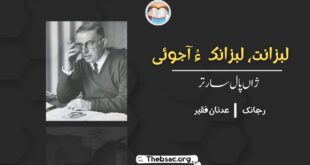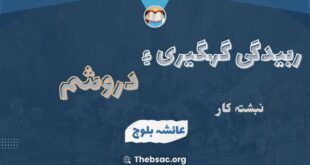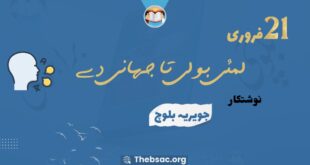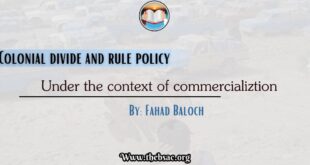Decolonizing the mind in perspective of Ngugi wa Thiong’o
Reviewed by Zeeshan Baloch
Baloch Students Action Committee
Various writers have written and debated on decolonization, each discussed different perspective. Among them is Ngugi wa Thiong’o, whose work is on decolonizing the literature, language and culture. Here I will be discussing one of his books, decolonizing the Mind.
The book “Decolonizing the Mind” by Ngugi wa Thiong’o is best-known and most-cited non-fiction publications which was published in 1986. He reflects on the impact of colonialism on language and literature. He discusses how the colonial experience has influenced the minds of African writers and intellectuals and emphasize the need to reclaim indigenous languages and cultures. Ngugi argues that language is a vital tool for cultural liberation and that the decolonization of the mind is essential for true independence of colonized people. The book provides insights into the author’s personal journey, political convictions, and his commitment to challenging the linguistic legacy of colonialism in African literature due to which today this book has been a part of continuing debate all over the world.
However, the writer Ngugi wa Thiong’o is a Kenyan writer who is well-known for his contributions to African literature. He was born in 1938 and is known for his novels and essays that explore themes of colonialism, self-identity, and post-colonial struggles of the colonized people. Ngugi is a champion of African languages in literature and has been a key figure in the decolonization of African literature. His notable works include “Weep Not, Child”, “Petals of Blood”, “Writer and Politics”, and including this book “Decolonizing the mind” and more other.
The Language of African literature:
The first chapter of this book takes about the language of African literature.
In the first chapter Ngugi argues that in Colonial world oppressed has always been exploited by the Oppressor and this oppression is mainly based on the Culture of the oppressed. Likewise, Ngugi says that, “the division of Africa may be based on economic or political division but the political and economic division cannot be complete until there isn’t a Culture division in it.” And this culture division directly impact the language, of the colonized. He argues that colonial powers intentionally imposed their languages and cultures on colonized societies, creating a division between the colonizers’ culture and the local cultures. This cultural division, according to Ngugi, not only reinforced the dominance of the colonizers but also undermined the self-esteem and identity of the colonized people.
Moreover, he argues that in 1962, there was a conference which was named, “A conference of African writer of English expression in Makerere University College Kampala, Uganda”. The involvement of Ngugi in this Conference played a pivotal role in shaping his thoughts on language, literature, and cultural identity. At the conference, those people were invited who were writing in English medium in Africa. So, he discusses that in the conference there was a notable discussion on the use of English as a medium for African writers. Ngugi, who was writing in English at that time, began to critically examine the implications of using a language inherited from colonial rule.
But, over the years Ngugi’s perspective evolved, leading to his eventual rejection of English in favor to write in Gikuyu, his mother tongue language. He expressed the view that the continued use of English in African literature propagated colonial legacies and restrained the expression of indigenous voices. His experiences at the Makerere Conference were influential in shaping his commitment to decolonizing African literature and reclaiming African languages from European colonizers.
Moreover Ngugi argue on 1952 declaration of state emergency in Kenya and say that the 1952 declaration of state emergency in Kenya changed the way how the schools were running in Kenya. The British colonizer wanted to control people, so they changed the education system to serve their interests. They made a curriculum which focus on British culture in Kenya and minimized the importance of local knowledge and history in Kenya. And these Schools focus on giving to peoples of Africa rather than encouraging them to think for themselves or for their nation.
He expressed that it would be easier for a person to communicate in his language but due to declaration of State emergency many schools which were in troubled areas had to shut down, due to which many students were impacted. Therefore, in this book he discusses how this affected his own thoughts. He thinks we should make the education system fairer and not to be controlled so much by colonial ideas.
Now, if we take a look at our education system we can see the similar tactics which were used in Kenya. The education system of Balochistan has been totally controlled by the colonial powers. Form our childhood tell today there has never been a curriculum which give important to our mother tongue language (Balochi, Brahvi) this is just because to divert our mind to a colonial mindset. The colonial power in Balochistan always tried hard to make us far from our native language (Balochi, Barhvi) but due to our active political organization in Balochistan we have been able enough to counter the colonizer ideas in Balochistan and hope more to counter them.
The language of African theatre:
In the second chapter of this book Ngugi argues that the Colonial powers used African theatre as a tool to serve their own interests by promoting European languages and cultural values in African theaters. They shaped the theatrical Surroundings to reinforce colonial ideologies and control the narratives presented on stage. Therefore, he argues for a shift in African theatre away from colonial influences. He refer to use local African languages in theatre to break free from the cultural dominance of colonial powers in Africa. And this change which he was taking about would empower African communities to express their own stories and preserve their cultural identity on the theatrical stage, and make the African people free from the Misrepresentations which was being imposed by colonial powers.
The language of African fiction:
In Second late chapter Ngugi discusses about the language of African fiction and take about how colonial power influenced the language used in African fiction. He argue that the colonial powers made African writers use European languages like English or French, which changed the way stories were told. Ngugi thinks this made African writers lose touch with their own cultures and made their stories less true to their experiences.
Moreover, He says African writers should use their own languages in stories to make them more real and true to their cultures. This, according to Ngugi, helps writers share the terms and diversity of African experiences without being influenced by the misrepresentation which was being given by the colonial powers for promoting colonial languages in Africa. Using African languages in stories becomes a way for writers to take back their own stories and show the world the true beauty of their cultures.
The quest for relevance:
Ngugi in the late chapter of this book argues for the importance of decolonizing the mind by reclaiming local languages and cultural expressions. He criticizes the continued influence of colonial languages and ideologies, emphasizing that true relevance comes from embracing and promoting one’s own cultural heritage.
He advocates the African writers to use their native languages in literature, seeing this as a way to resist the cultural imperialism of colonial languages. He contends that relevance is achieved by breaking away from the linguistic and cultural chains of colonialism, allowing African writers to honestly capture and convey the complexities of their experiences. Overall, Ngũgĩ’s view in the last chapter underscores the quest for relevance as inseparable from the decolonization of language and the restoration of cultural pride for the colonial power of African.
Conclusion:
In conclusion, I clear out that the book “Decolonizing the Mind” by Ngugi wa Thiong’o is a seminal work that delves into the impact of colonialism on language, literature, and cultural identity.
He Reflects on his own experiences as a Kenyan writer and discuss the profound influence of colonial powers on the minds of colonized people. The book explores how language, specifically the imposition of European languages, became a tool of cultural domination and contributed to the erasure of local knowledge and perspectives of African.
Moreover, connecting this to Balochistan’s colonial history we can see the same pattern of colonial oppression. Balochistan, like many other regions, faced the imposition of external rule and internal both, which often involved linguistic and cultural subjugation. The colonial system in Balochistan, is being shaped by external powers which have impacted the local languages, literature, and cultural expressions of Baloch as the theme which Ngugi discusses in the context of Africa.
Hence, the book “Decolonizing the Mind” serves as a call to reclaim cultural identity by challenging the linguistic legacies of colonialism. And the oppressed Baloch should involve examining how colonial forces influenced language, literature, and cultural narratives in the region and exploring avenues for reclaiming indigenous voices and expressions.
 BSAC Struggling For Knowledge And Unity
BSAC Struggling For Knowledge And Unity 




Eminem, настоящее имя Маршалл Брюс Мэтерс III, известен как один из величайших рэп-исполнителей всех времен. Своими пронзительными текстами, ярким стилем и потрясающим мастерством в ритме и рифме он завоевал миллионы поклонников по всему миру. Его лучшие песни включают “Lose Yourself”, гимн к само-преодолению, “Stan”, с поразительно интенсивным сюжетом, и “Rap God”, где он демонстрирует свою невероятную скорость и технику. Все эти треки, а также многие другие, отражают его гениальность и влияние на музыкальную индустрию. Скачать mp3 музыку 2024 года и слушать онлайн бесплатно.
batmanapollo.ru
2024
Майор Гром 2024
Психолог
Здесь вы найдете разнообразный видео контент интурист
ялта цены на 2023
Fantastic beat ! I would like to apprentice even as you amend your
website, how can i subscribe for a weblog site? The account
aided me a acceptable deal. I have been tiny bit familiar of this
your broadcast provided vivid transparent concept